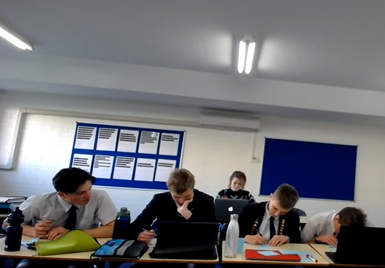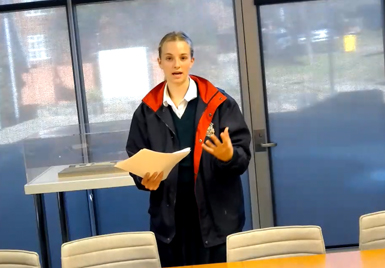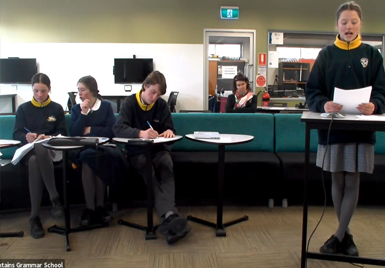National Virtual Debating Rules and Guidelines
The NGS National Virtual Debating Competition is an online debating competition for schools that has been running since 2015. The competition allows schools from all states and territories across Australia to compete in high quality debates against schools they would usually not have access to.
All schools in Australia are eligible to enter the competition provided they meet the minimum technical requirements laid out below.
Competition Structure
In 2020 the competition will be run as a Round Robin + Knockout event across the following divisions:
- Primary School (Years 5+6)
- Junior School (Years 7+8)
- Middle School (Years 9+10)
- Senior School (Opens)
Teams will be placed into groups with the top two teams from each group progressing to the knockout stages. The knockouts stages will be single elimination format.
All match-ups in the competition are to be negotiated by the school coordinators in advance of the match-up. Each team will be required to coordinate a match-up with each of the other teams in their group, these matches must occur within the group stage time-frame. The Knockout stages will then occur through October and November. Teams that are unable to negotiate a suitable time within the allotted window will automatically forfeit the match/es that are incomplete.
Group Stage
The group stage will start on 20th July (though teams may begin negotiating prior to this date). Each team will have anywhere from 3 to 6 matches to negotiate during this period (depending on their division and group) and may schedule them at any time throughout the group stage window (keeping in mind that Primary and Junior divisions require a weeks notice for topic release). These match-ups do not need to be completed in the order shown on the draw, as long as each of the three match-ups is scheduled within the group stage window.
Any match-ups that have not been scheduled within the group stage window will be void. The AISNSW coordinator will either mark the result as null and void or in the event that one team has been trying to organise the match-up and had difficulty with the other team a win by forfeit may be granted.
The top two teams from each group will progress to the knockout stage. Where two or more teams are on the same points the team to progress will be decided via head to head result and then by most points scored via adjudication across their three matches.
When negotiating, please copy (cc) debating@aisnsw.edu.au into any conversations so that the correspondence history can be easily followed.
Knockout Stage
The top two teams from each group will progress to the knockout stage and match-ups will be run through October and November
Any match-ups that have not been scheduled within the relevant time period will be void. A winner will be determined by the AISNSW coordinator, where a clear decision can not be made the team progressing will be decided on count-back of previous results. If there is still no clear winner the team with the highest scores over their previous match-up will progress.
When negotiating, please copy (cc) debating@aisnsw.edu.au into any conversations so that the correspondence history can be easily followed.
Debate Structure
All debates in the competition are formatted as a 3v3 debate with the option of a 4th “silent”speaker. There are no Point of Information or Replies (brief interruptions from opposing team of the speaker to provide a question or statement regarding information in the speaker’s argument) in this competition. The adjudicator or host will use claps to indicate to speakers how much time they have used, a continuous clap will occur if a speaker exceeds their time limit and no further argument will be considered in the adjudication. Please refer to the table below for specific information pertaining to each division.
Division
| Details
| Speaking Allowance per speaker
| Warning Clap (single clap)
| Continuous Clap
|
Primary School (Yr 5+6)
| Coordinator Assistance: Coordinators can assist with technique, approach and content in the lead up to the debate. No assistance during the debate.
Preparation: The topic and assignments will be released 1 week prior to the debate, students may begin preparation as soon as the topic is released. Computers may be used during preparation.
| 4 minutes
| 3 minutes
| 4 mins, 15 secs
|
Junior School (Yr 7+8)
| Coordinator Assistance: Coordinators can assist with technique and approach content in the lead up to the debate. No assistance can be provided on content. No assistance during the debate.
Preparation: The topic and assignments will be released 1 week prior to the debate, students may begin preparation as soon as the topic is released. Computers may be used during preparation.
| 5 mins
| 4 mins
| 5 mins, 15 secs
|
Middle School (Yr 9+10)
| Coordinator Assistance: Coordinators can assist with technique and approach only in the lead up to the debate. No assistance can be given on content and argument. No assistance during the debate.
Preparation: The topic and assignments will be released at the start of the debate - prep time will be 1 hour, students may begin preparation as soon as the topic is released. Computers/internet can be used for first 15 minutes of preparation time ONLY.
| 6 mins
| 5 mins
| 6 mins, 15 secs
|
Senior School (Opens)
| Coordinator Assistance: No assistance can be provided by the Coordinator.
Preparation: The topic and assignments will be released at the start of the debate - prep time will be 1 hour, students may begin preparation as soon as the topic is released. Computers/internet can be used for first 15 minutes of preparation time ONLY.
| 7 mins
| 6 mins
| 7 mins, 15 secs
|
Scoring and Adjudication
An adjudicator will be assigned to each debate, either live or post the debate via a review of the recording. Where possible the adjudicator will deliver the result at the conclusion of the debate. The final score sheet will also be loaded into the match-up on the relevant division's page after the scores have been submitted by the Adjudicator.
Scoring will be between 70-80 with the average speech receiving a 75. The scores will further be divided into three sections: Matter (or content: the logical construction of arguments and the level of engagement in refutation), Manner (or style: the use of verbal and nonverbal techniques to engage the audience) and Method (or structure and strategy: the organisation of the speech to maximise clarity and persuasiveness). Matter and Manner will be worth 40 marks each and Method will be worth 20 marks: a speech with average Matter or Manner will receive a 30, and a speech with average Method shall receive a 15, etc.
For further information on scoring or the technical aspects of debating please consult the Australasian Debating Guide website.
Competition Rules
Please refer to the list below for a list of rules that school coordinators and students must adhere to as part of participation in the competition.
- A coordinator must be present for the entire debate (including prep time for Middle School and Senior School divisions). The coordinator should be visible on camera and is present to ensure the students are following correct procedure and etiquette.
- Computers may be used in preparation time ONLY as per table above. All computers should be closed and once permitted time has elapsed
- In previous years computers could be used as palm cards, however they will not be permitted for this use in the 2020 competition
- All debaters (including silent 4th speaker) should be visible on camera at all times during preparation (Middle Schools and Senior School debates only) time.
- All debaters (including silent 4th speaker) should be visible on camera when opposition is speaking
- Current speaker should be visible and clearly identified on camera while speaking
- if using single view only, the speaker should stand
- if using multiple views, the camera should change to show speaker and then toggled back to the team at completion of the speakers argument
- Microphones should be muted while opposition is speaking to minimise noise interruptions
- Coordinators should connect to the debate at least 10 minutes prior to the scheduled start time and teams should be present and ready to start at the scheduled start time.
- If a debate is delayed by more than 15 minutes from the scheduled start time the Adjudicator will close the debate and report to the AISNSW Coordinator.
- In the case of unforeseen technical issues, such as power outages, the match will be rescheduled if possible, at the discretion of the AISNSW Coordinator, otherwise a forfeit win will be awarded to the team who was present.
- Any concerns over a result must be submitted by the school coordinator via the 'Debate Review Form' on the website within 24 hours of completion of the debate. Reviews will only be conducted if a coordinator was present and has genuine concerns that the result was unfair. If the review is upheld the AISNSW coordinator will escalate the debate to the senior adjudicator for additional adjudication.
- All debates will be recorded and kept for 48 hours for review purposes only.
- It is the coordinators responsibility to ensure that all students under their care behave in a manner that is respectful to both the opposition and the adjudicator at all times.
Camera Setup
Please ensure you follow the correct camera setup during the debate as per bellow:
- Preparation time (Middle School and Senior School divisions): Coordinator and all debaters should be visible on camera during the entire preparation time
- During the debate:
- Current Speaker should be clearly seen on camera
- Opposition team should all be clearly visible on camera while opposition is speaking
Examples:

| 
| 
|
Example of preparation time setup and listening view
Coordinator visible and all 4 debaters visible.
| Speaker example 1 (multiple view setup)
Speaker clearly visible on camera
| Speaker example 2 (single view setup)
Speaker clearly identified and on camera
|
Coordination and Running of an Individual Debate
It is the responsibility of the school coordinator to schedule, organise and oversee each debate for their team/s by following the steps listed below:
Scheduling a debate:
- Refer to the draw on the website and locate the teams next opposition (in the group stage you can schedule any of your three matches in any order)
- Contact the coordinator from the opposition school and negotiate a date and time within the relevant window (cc debating@aisnsw.edu.au into your communications)
- Decide who will submit the Debate Nomination Form (only one form needs to be submitted per debate) and then submit accordingly
- Refer back to the draw for confirmation of date and time (within 24 hours of nomination form being submitted)
- For Primary and Junior debates refer back to the draw one week prior to the debate to obtain the topic, assignments and debate link
On the day of the debate:
- Refer to the draw to obtain the Zoom link for the debate
- Join the virtual room at least 10 minutes prior to the debate start time and setup room, cameras and seating
- Carry out a sound check with Adjudicator or host when both teams are present
- Oversee the debate to ensure all rules, behaviour and etiquette's are followed during the entire debate as set out in this guide
- Mute microphone when opposition is speaking, un-mute when your team is speaking
- Where needed, move the camera position during speaker’s argument to focus on the speaker and then back to the full team when opposition is speaking
Minimum Technical Requirements
To participate in the Program, schools should ensure they can meet the requirements listed below, a test connection will be done with all participating schools prior to the competition start.
- reliable internet connection
- Video conferencing encoder (codec - H323/SIP) OR
- Desktop/laptop computer with the following peripherals
- Microphone - ability to pick up participant input from anywhere in a reasonable sized room. They are also “echo-cancelling” which means output from the speakers is detected and not permitted to loop back through the microphone; very disconcerting for those speaking at the other end and unacceptable in a debate scenario.
- High Definition (HD) Camera - HD quality camera preferably one that can ZOOM and PAN to any position in the room. Programmable pre-set positions are highly desirable.
- Speakers - sound output sufficient so incoming audio can be heard comfortably anywhere in the room
- TV or projector for input
If you do not have this equipment already, you must commit to purchasing it prior to the competition starting.
Other Useful Information
Time Zones
As the competition operates across a number of different time zones, we ask that all dates submitted for debates are entered in the current NSW time format for that debate. Meaning during daylight savings all nomination forms should be submitted in AEDT time, likewise when not in daylight savings all nomination forms should be submitted in AEST time. A display for each time zone is listed below for reference.
Use of Computers During a Debate
As outlined above, authentic preparation using internet enabled devices is allowed for all levels of debates in the competition, however in the Middle School and Senior Divisions devices can ONLY be used for the first 10 minutes.
Unlike in previous years, computers and devices cannot be used during the debate to act as palm cards.
Where Can I Get More Information
If you would like more information about this competition please contact the NGS Super National Virtual Debating Coordinator.